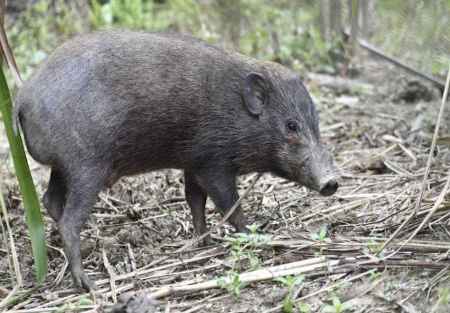Pygmy hogs—the world's smallest and rarest wild pig—are under a virus lockdown.
Not because of the coronavirus, but because of the first outbreak of African swine fever in India. There is neither a vaccine nor cure for the highly contagious viral disease that has already killed over 16,000 domestic pigs, said Pradip Gogoi, an official at Assam state's animal husbandry wing.
The shy, 10-inch tall pygmy hogs suffered severe habitat loss and were thought to be extinct in the 1960s. Then in recent decades, a captive breeding program and other conservation efforts have brought the species back.
Now there are nearly 300 animals living in pockets of the northeastern state of Assam, but scientists fear the virus could decimate the still-endangered population.
After authorities confirmed the swine fever outbreak reached India on May 18, scientists virtually locked down the breeding centers and adopted strict precautions, said Parag Deka, who heads the Pygmy Hog Conservation Program run jointly by Indian authorities, U.K.-based Durrell Wildlife Conservation Trust and local nonprofit Aaranyak.
"It is very scary," Deka said. "It can wipe out the whole population."

The virus spreads mainly by direct contact between pigs, through infected meat or contaminated material—and a vaccine is realistically two or three years away, said Linda Dixon, who has been researching the virus at The Pirbright Institute in the U.K.
The virus kills almost all infected pigs, Dixon said. "It can decimate populations of wild pig or domestic pig. It could be very bad."
At the breeding centers at Nameri and the state capital Guwahati, where there are 82 pigs and piglets, scientists have erected two parallel security fences. No visitors are allowed, and cars can't park at the facilities.
Some staff members who live off-site need to leave their shoes at the entrance. Then they must shower, wash their hands and feet, dip their feet in anti-viral solution and don fresh shoes to go inside.
"This is the new normal," Deka said.
Click here to see more...